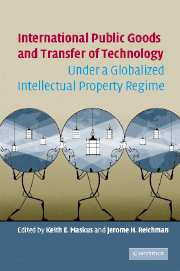Book contents
- Frontmatter
- Contents
- List of contributors
- Preface
- PART I International Provision of Public Goods under a Globalized Intellectual Property Regime
- PART II Innovation and Technology Transfer in a Protectionist Environment
- PART III Sectoral Issues: Essential Medicines and Traditional Knowledge
- PART IV Reform and Regulation Issues
- 22 Issues Posed by a World Patent System
- 23 Intellectual Property Arbitrage: How Foreign Rules Can Affect Domestic Protections
- 24 An Agenda for Radical Intellectual Property Reform
- Comment: Whose Rules, Whose Needs? Balancing Public and Private Interests
- 25 Diffusion and Distribution: The Impacts on Poor Countries of Technological Enforcement within the Biotechnology Sector
- 26 Equitable Sharing of Benefits from Biodiversity-Based Innovation: Some Reflections under the Shadow of a Neem Tree
- 27 The Critical Role of Competition Law in Preserving Public Goods in Conflict with Intellectual Property Rights
- 28 Expansionist Intellectual Property Protection and Reductionist Competition Rules: A TRIPS Perspective
- 29 Can Antitrust Policy Protect the Global Commons from the Excesses of IPRs?
- Comment I: Competition Law as a Means of Containing Intellectual Property Rights
- 30 “Minimal” Standards for Patent-Related Antitrust Law under TRIPS
- Comment II: Competitive Baselines for Intellectual Property Systems
- 31 WTO Dispute Settlement: Of Sovereign Interests, Private Rights, and Public Goods
- 32 The Economics of International Trade Agreements and Dispute Settlement with Intellectual Property Rights
- 33 Intellectual Property Rights and Dispute Settlement in the World Trade Organization
- 34 WTO Dispute Resolution and the Preservation of the Public Domain of Science under International Law
- 35 Recognizing Public Goods in WTO Dispute Settlement: Who Participates? Who Decides? The Case of TRIPS and Pharmaceutical Patents Protection
- Index
34 - WTO Dispute Resolution and the Preservation of the Public Domain of Science under International Law
Published online by Cambridge University Press: 05 May 2010
- Frontmatter
- Contents
- List of contributors
- Preface
- PART I International Provision of Public Goods under a Globalized Intellectual Property Regime
- PART II Innovation and Technology Transfer in a Protectionist Environment
- PART III Sectoral Issues: Essential Medicines and Traditional Knowledge
- PART IV Reform and Regulation Issues
- 22 Issues Posed by a World Patent System
- 23 Intellectual Property Arbitrage: How Foreign Rules Can Affect Domestic Protections
- 24 An Agenda for Radical Intellectual Property Reform
- Comment: Whose Rules, Whose Needs? Balancing Public and Private Interests
- 25 Diffusion and Distribution: The Impacts on Poor Countries of Technological Enforcement within the Biotechnology Sector
- 26 Equitable Sharing of Benefits from Biodiversity-Based Innovation: Some Reflections under the Shadow of a Neem Tree
- 27 The Critical Role of Competition Law in Preserving Public Goods in Conflict with Intellectual Property Rights
- 28 Expansionist Intellectual Property Protection and Reductionist Competition Rules: A TRIPS Perspective
- 29 Can Antitrust Policy Protect the Global Commons from the Excesses of IPRs?
- Comment I: Competition Law as a Means of Containing Intellectual Property Rights
- 30 “Minimal” Standards for Patent-Related Antitrust Law under TRIPS
- Comment II: Competitive Baselines for Intellectual Property Systems
- 31 WTO Dispute Settlement: Of Sovereign Interests, Private Rights, and Public Goods
- 32 The Economics of International Trade Agreements and Dispute Settlement with Intellectual Property Rights
- 33 Intellectual Property Rights and Dispute Settlement in the World Trade Organization
- 34 WTO Dispute Resolution and the Preservation of the Public Domain of Science under International Law
- 35 Recognizing Public Goods in WTO Dispute Settlement: Who Participates? Who Decides? The Case of TRIPS and Pharmaceutical Patents Protection
- Index
Summary
ABSTRACT
The TRIPS Agreement can be read to reflect a static view of the structure of intellectual property law. In this chapter, we address whether – and how – the TRIPS Agreement can be interpreted to give it more fluidity, and thus to allow adjustments in national intellectual property regimes designed to reflect the dynamic nature of information production. To focus that inquiry, we concentrate on efforts to ensure a broader public domain for “upstream” inventions by modifying various elements of U.S. patent law. The paper considers three stylized examples and asks whether each approach could be adopted by the United States without falling afoul of the TRIPS Agreement, as it is currently understood. Our purpose is to identify interpretive approaches that allow Members to keep their laws attuned to the developments and needs of science. In so doing, we also raise broader questions regarding the level of formalism generated by the WTO dispute settlement system, and the extent to which the TRIPS Agreement allocates power between supranational and national institutions, and between international and national laws.
Introduction
The size and content of a rich public domain are affected by a constellation of national intellectual property rules: provisions that define protectable subject matter, establish threshold requirements for protection, delineate the scope of the rights awarded, create defenses and exemptions from liability, and set remedies for infringement.
- Type
- Chapter
- Information
- International Public Goods and Transfer of Technology Under a Globalized Intellectual Property Regime , pp. 861 - 883Publisher: Cambridge University PressPrint publication year: 2005
- 4
- Cited by



